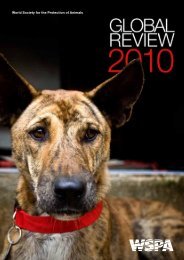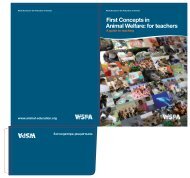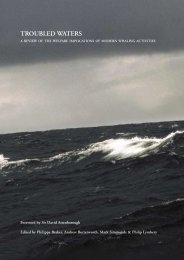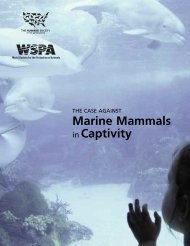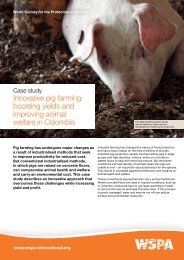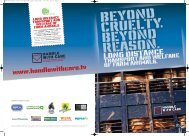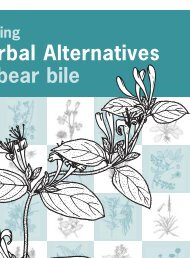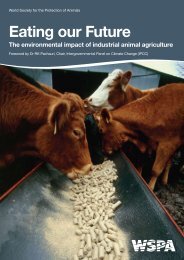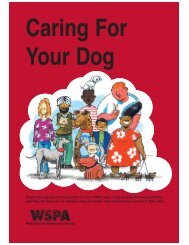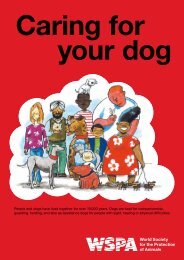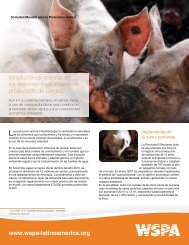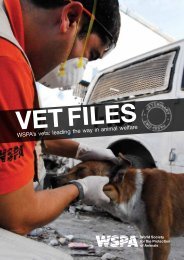Proceedings of the Untangled symposium: - WSPA
Proceedings of the Untangled symposium: - WSPA
Proceedings of the Untangled symposium: - WSPA
You also want an ePaper? Increase the reach of your titles
YUMPU automatically turns print PDFs into web optimized ePapers that Google loves.
Annex 4Submitted abstracts accompanyingposter presentationsThe role <strong>of</strong> ocean industries in reducing marine debrisPaul HolthusExecutive Director3035 Hibiscus Drive, Honolulu, Hawaii, USA 96815paul.holthus@oceancouncil.orgThe marine environment is not only home to a major part<strong>of</strong> <strong>the</strong> world’s biodiversity, it is also home to a diverseand growing array <strong>of</strong> ocean use and activities: shipping,fishing, <strong>of</strong>fshore oil and gas, aquaculture, <strong>of</strong>fshorerenewable energy, tourism, etc. Because <strong>the</strong> ocean is aninterconnected global ecosystem supporting a wide range<strong>of</strong> uses, <strong>the</strong> single most important factor determining<strong>the</strong> health <strong>of</strong> <strong>the</strong> ocean is <strong>the</strong> way business is done in<strong>the</strong> marine environment. Many companies are trying toreduce <strong>the</strong>ir ocean footprint. However, <strong>the</strong> best efforts bya single company or an entire industry will not be enoughto address cumulative impacts in <strong>the</strong> inter-connectedmarine “commons”. Multi-sectoral industry leadership andcollaboration is essential to addressing cross-cutting andcumulative impacts to marine biodiversity, such as <strong>the</strong>effects <strong>of</strong> marine debris. There is a need and opportunityto bring toge<strong>the</strong>r ocean industry leaders in “CorporateOcean Responsibility” to change <strong>the</strong> way industrysectors interact with each o<strong>the</strong>r and with o<strong>the</strong>r oceanstakeholders in a changing ocean world to address majorthreats. The private sector must be a partner in developingand implementing <strong>the</strong> solutions to reduce <strong>the</strong> volume <strong>of</strong>marine debris that entangles marine animals and removingdebris that is already in <strong>the</strong> marine environment.Vida marina: marine debris reduction in Puerto Ricousing an innovative university-based/communityoutreachmodelRobert J. Mayer and Tamara Trinidad-GonzálezCenter for Coastal Restoration and ConservationUniversity <strong>of</strong> Puerto Rico at Aguadilla, P.O. Box 6150,Aguadilla, Puerto Rico (USA), 00662robert.mayer@upr.eduThe excessive production <strong>of</strong> solid waste in Puerto Rico isa serious problem that is not being properly addressed.Approximately 80%, <strong>of</strong> <strong>the</strong> abundant, marine debrisfound on <strong>the</strong> coast <strong>of</strong> PR enters <strong>the</strong> environment throughrivers and streams. As a result <strong>of</strong> this, entangled animals(e.g. sea turtles, marine mammals, shorebirds etc.) arevery commonly seen in this area.The University <strong>of</strong> Puerto Rico at Aguadilla (UPRAg)has developed <strong>the</strong> first systematic initiative <strong>of</strong> marinedebris monitoring and reduction on <strong>the</strong> Archipelago<strong>of</strong> Puerto Rico.The UPRAg’s Center for Coastal Restoration andConservation (CCRC) began operations in 2007 andis operated by undergraduate student volunteers froma wide range <strong>of</strong> academic disciplines. This program isoperated from <strong>the</strong> UPRAg but has groups <strong>of</strong> well-trainedvolunteers in 9 o<strong>the</strong>r UPR campuses. All <strong>the</strong> volunteersreceive training on <strong>the</strong> sources, impacts and possiblesolutions to <strong>the</strong> problem <strong>of</strong> aquatic debris, environmentaleducation and marine debris recovery techniques.The main goal <strong>of</strong> <strong>the</strong> CCRC is to reduce <strong>the</strong> amount <strong>of</strong>marine debris on <strong>the</strong> coast <strong>of</strong> PR and it is funded byFederal and State Government agencies as well as <strong>the</strong>private sector.It operates a network <strong>of</strong> 80 mon<strong>of</strong>ilament-recyclingcontainers on <strong>the</strong> main fishing hot spots <strong>of</strong> <strong>the</strong>Archipelago. Volunteers monitor and maintain <strong>the</strong>m, <strong>of</strong>fertalks on aquatic debris, have organized cleanup eventsand have recovered and recycled approximately 2,900lbs. <strong>of</strong> used mon<strong>of</strong>ilament line from <strong>the</strong> environmentsince 2007. The program received an U.S. EPAEnvironmental Quality Award in 2008.The CCRC has also involved commercial anglers insolving this problem by operating an incentive program,for local commercial anglers, which consists <strong>of</strong> acompetition <strong>of</strong> marine debris removal that focuses onderelict fishing gear. Participants were trained on <strong>the</strong>correct techniques <strong>of</strong> marine debris removal and workedand removed debris during a 10-month period. Staffmembers scored and classified <strong>the</strong> recovered materialon a regular basis. A total <strong>of</strong> 18,351 lbs <strong>of</strong> marine debris(mainly derelict fishing gear) were removed from <strong>the</strong>environment! The competitors were awarded three prizesbased on <strong>the</strong> total amount <strong>of</strong> debris collected.A significant increase in public awareness and instewardship, has been observed as a result <strong>of</strong><strong>the</strong>se initiatives.Undergraduate student participation on <strong>the</strong>se projectshas contributed to <strong>the</strong> creation <strong>of</strong> a group <strong>of</strong> studentswith excellent planning, communication, grantsmanshipand o<strong>the</strong>r skills while at <strong>the</strong> same time creating a new37



